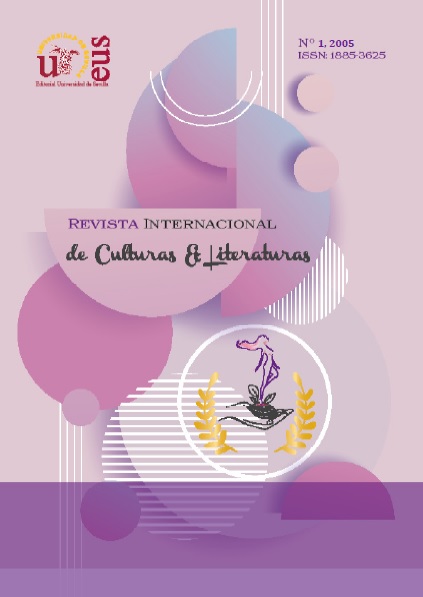LA REPRESENTACIÓN DE LA MUJER EN LA ROMA DE LA POSGUERRA: EL TEATRO DE ENNIO FLAIANO
DOI:
https://doi.org/10.12795/RICL.2005.i01.05%20Palabras clave:
Ennio Flaviano, teatro, mujer, RomaResumen
La mayoría de las mujeres que aparecen en la obra dramática del escritor italiano Ennio Flaiano (1910-1972) responden fundamentalmente al perfil general de mujer emancipada y liberada, quizás en exceso, al prototipo de mujer que aparece en La dolce vita de Fellini, en la que el autor colaboró como guionista. Son mujeres que no se presentan a sí mismas, sino a través de sus relaciones con los hombres protagonistas del teatro de Flaiano, de lo que les hacen sentir o no. La mayoría de ellas pertenecen al círculo intelectual-artístico de la Roma de la posguerra, mujeres liberadas pero que, en realidad, todavía desempeñan un papel secundario respecto al hombre. Mujeres en busca de la ‘gran ocasión’, el matrimonio, y es en este campo, el de las relaciones personales más íntimas en el que se van a mover todas las mujeres que aparecen en su teatro. Se trata fundamentalmente del amor, o más bien el deseo carnal, que parte de los personajes masculinos hacia las mujeres.
Abstract
Most of the women who appear in the dramatic work of the Italian writer Ennio Flaiano (1910-1972) respond fundamentally to the general profile of an emancipated and liberated woman, perhaps in excess, to the prototype of a woman that appears in Fellini's La dolce vita, in the one in which the author collaborated as a scriptwriter. They are women who do not present themselves, but rather through their relationships with the leading men of Flaiano's theater, what they make them feel or not. Most of them belong to the intellectual-artistic circle of post-war Rome, liberated women who, in reality, still play a secondary role compared to men. Women in search of the ‘great occasion’, marriage, and it is in this field, that of the most intimate personal relationships in which all the women who appear in his theater are going to move. It is fundamentally about love, or rather carnal desire, which starts from the male characters towards women.
Descargas
Citas
Antonucci, G., “Flaiano e il teatro”, en Sergiacomo, pp. 131-140., 1993.
Atti del Convegno nazionale nel decennale della morte dello scrittore Ennio Flaiano, L’uomo e
l’opera, Pescara, Ediars, 1982.
Atti del Convegno, Flaiano e il tempo del “Mondo”, Pescara, Ediars, 1989.
Atti del Convegno nazionale, Tempo di uccidere, Pescara, Ediars, 1994.
Atti del Convegno nazionale, Il teatro di Flaiano, Pescara, Ediars, 1995.
Ciarletta, N., “Il teatro di Flaiano”, en Atti, pp. 93-98., 1982.
Feo de, S., “Un marziano a Roma”, en Sergiacomo, pp. 252-253, 1992.
Flaiano, E., Opere: scritti postumi e scritti 1947-72, volumi I e II, Milano, Classici Bompiani,
Flaiano, E., Un marziano a Roma e altre farse, Torino, Einaudi,1971.
Geron, G., “La conversazione continuamente interrotta”, en Atti, pp. 29-33, 1995.
Laurenzi, C., “Tutto il teatro di Flaiano”, Il Dramma, aprile 1972.
Mango, A., “Conversazione continuamente interrotta”, Il Sipario, agosto-settempre 1972.
Moretti, V. (ed.), Flaiano e “Oggi e Domani”, Pescara, Ediars, 1993.
Pensa, C. M., “Un marziano a Roma”, en Atti, pp. 20-23, 1995.
Poesio, P. E., “Flaiano e le sue farse”, en Atti,, pp. 34-40, 1995.
Pullini, G., “La critica al teatro di Ennio Flaiano (1946-1993), en Atti, pp. 55-68, 1995.
Rebora, R., “Vocazione mancata di un marziano”, Il Sipario, gennaio, 1961.
Salce, L., “La conversazione continuamente interrotta”, en Atti, pp. 99-104, 1982.
Sergiacomo, L., (ed.), Flaiano vent’anni dopo, Pescara, Ediars, 1993.
Sergiacomo, L., “Le donne raccontate da Flaiano”, en Sergiacomo, pp. 109-120., 1993.
Sergiacomo, L., (ed.), La critica e Flaiano, Pescara, Ediars, 1992.
Tian, R., “Il teatro di Flaiano”, en Atti, pp. 7-12, 1995.

